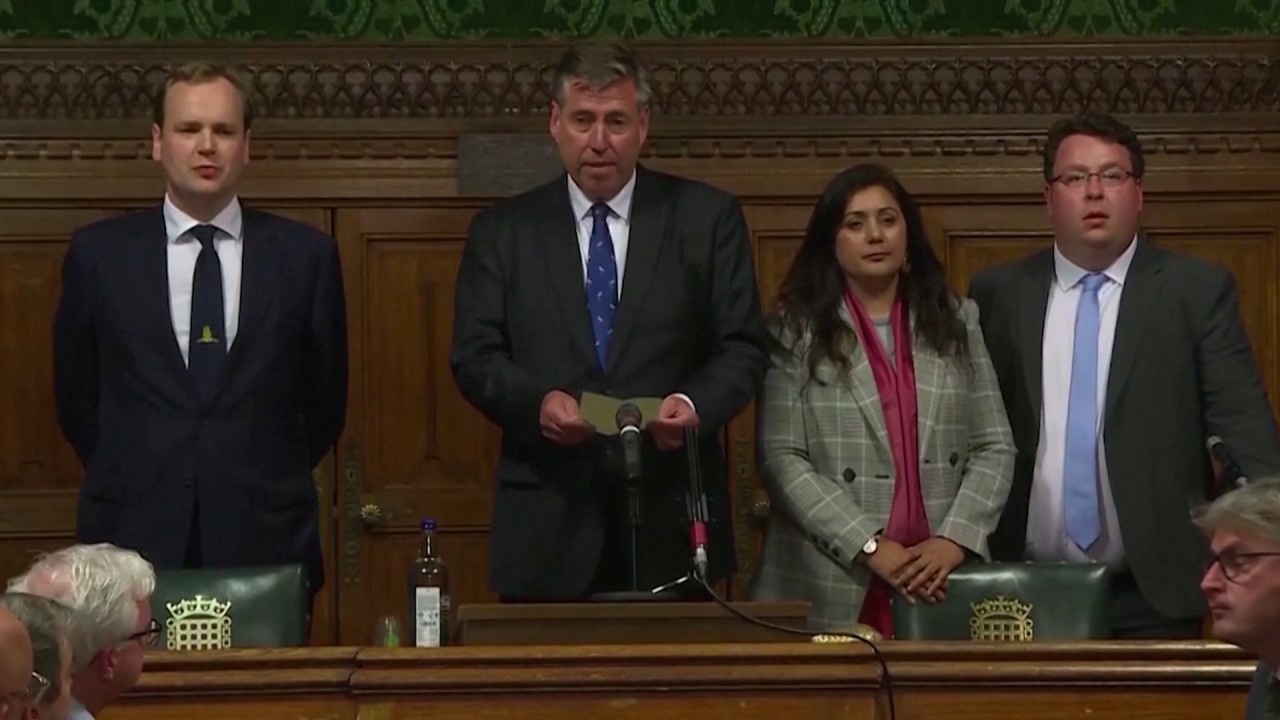
00:49
British Prime Minister Boris Johnson survives no-confidence vote
Analysis | ‘Greased piglet’ Boris Johnson survives as UK prime minister. For now
- Prime minister’s Conservative Party only just approves him in confidence vote
- Scale of mutiny against Boris Johnson suggests his days may be numbered
He survives, just, for now. But he is deeply wounded and even loyal lawmakers who backed him in a confidence vote say he must now change – return to the traditional ideals of the governing Conservative Party, foster unity and lead.
The master of political comebacks might struggle this time.
Ed Costelloe, chair of the group Conservative Grassroots who backed Johnson in 2019, said he had got many things right, but had been brought down by the so-called “partygate” scandal over his breaches of Covid-19 lockdown rules.
“Once you face a vote of confidence somehow you are doomed. After that, the vultures start gathering. I think he is in real, real trouble,” he said.
The vote dominated British newspaper front pages on Tuesday. The Times described Johnson as “A wounded victor” and pointed out that he won the vote 211 to 148, a worse showing than when lawmakers tried to oust his predecessor Theresa May, who won her vote but then resigned six months later.
Under the headline “Hollow victory tears Tories apart”, The Daily Telegraph said Johnson was “clinging to power” while The Financial Times said the margin of his victory “left him badly damaged and exposed the scale of the division and animosity in his party”.
“PM clinging to power after vote humiliation,” The Guardian said, while Daily Mirror, which helped break the “partygate” story, simply said “Party’s over, Boris”.
The Daily Mail was among the few supportive papers, saying “Boris vows: I’ll bash on”.
The confidence vote was a brutal wake up call for a leader whose mandate once seemed unassailable after his promise to “get Brexit done” in 2019 won over voters in parts of the country the Conservatives had never been able to capture and the party’s biggest majority in over three decades.
Since then, the list of reasons lawmakers gave for wanting Johnson gone were as varied as they are many, cutting across usual factional lines and making the rebels somewhat uneasy bedfellows.

As reasons why the 57-year-old leader should resign, lawmakers cite anything from “partygate”, threats to breaking international law, the defence of rule-breakers at the heart of power, multiple policy U-turns, an initial slow response to Covid-19 to a general lack of respect for his office.
It was perhaps the lack of cohesion in Monday’s rebellion that helped save him. But it has left him weakened.
Political survival is something Johnson, known widely as Boris, has made a career of, with former prime minister David Cameron likening him to a “greased piglet” who is hard to catch.
“My friends, as I have discovered myself, there are no disasters, only opportunities. And indeed, opportunities for fresh disasters,” Johnson wrote in a newspaper column in 2004.
In a speech to the party lawmakers just hours before the vote, Johnson remained adamant he could win again.
“If you don’t believe that we can come back from our current position and win again then you haven’t looked at my own record or the record of this party,” he said, according to a senior party source in the meeting.

After the vote, Johnson called the 211-148 split a “convincing result, a decisive result”.
“As a government we can move on and focus on the stuff that really matters,” he told reporters.
Some have warned of underestimating Johnson, or Alexander Boris de Pfeffel Johnson, saying his ruffled appearance and distinctive mop of blond hair masks the discipline and ruthlessness he needed to get to this point.
But after years of weathering sex scandals, gaffes and missteps as London mayor, foreign secretary and now prime minister, Johnson, a relative loner in the Conservative Party, might be running out of road.
For some in the party the rot set in when he defended his former adviser Dominic Cummings when he broke Covid-19 rules early in the pandemic, enraging the country.
The following year he initially defended a Conservative lawmaker who had been found guilty of breaching lobbying rules and a U-turn on extending free school meals to children from low-income families did little to improve the picture.
The final straw was months of a steady drip of stories about lockdown-breaking parties in Johnson’s Downing Street culminating in a report last month detailing fights and alcohol-induced vomit in the early house at times when the rest of the country was obeying strict Covid-19 rules.
One former Conservative lawmaker was so incensed even before the report, they “crossed the floor” or went to join the main opposition Labour Party.
“Prior to leaving … it was just embarrassing being asked to defend the indefensible for a PM who clearly has no morals,” Christian Wakeford, who joined Labour in January, said.
The question is now much authority Johnson can continue to command, according to John Curtice, professor of politics at the University of Strathclyde in Glasgow.
“It’s not a given that Johnson will lead the party into the next election,” he said. “The result is bad enough to raise questions about the long-term future of his leadership.”
Conservative Grassroots chair Costelloe said: “I am firmly of the view if he is still there in two years then we will lose the next election”.
Additional reporting by Agence France-Presse and Bloomberg

